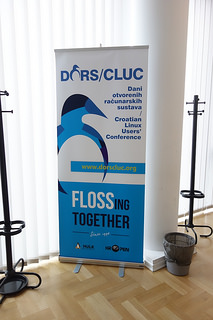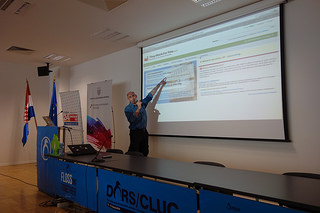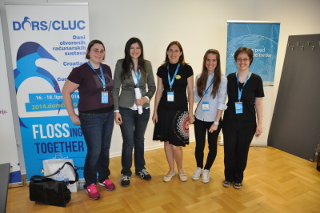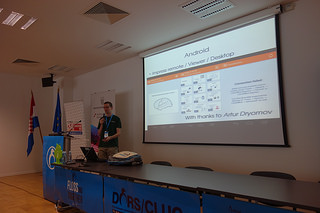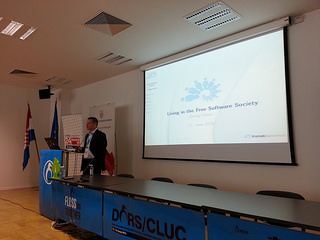Several months ago I was invited to give a keynote at the DORS/CLUC conference in Croatia on the OpenStack Continuous Integration System. I’ve been excited about this opportunity since it came up, so it was a real pleasure to spend this past week at the conference, getting to know my friend Jasna better and meeting the rest of the conference crew and attendees.
Each day I attended for the keynotes, as they were all in English, and on Monday I also participated in a Women in FLOSS panel. The evenings were spent exploring the beautiful city of Zagreb, which I’ll write about in another post once I upload my photos.
The first keynote was by Georg Greve who spoke on Kolab in his talk “Kolab: Do it right, or don’t do it at all” (slides here). I evaluated Kolab for use about 3 years ago and it was a bit rough around the edges, and I believe it was still using Horde as the webmail client. It was interesting to learn about where they’ve gone with development and the progress they’ve made. I was happy to learn that they are still fully open source (no “open core” or other kinds of proprietary modules for paying customers). Today it uses RoundCube for webmail, which I’d also go with if I were in a position to deploy a webmail client again. Finally, he spoke some about the somewhat unexpected success of their hosted Kolab solution, MyKolab, which had me seriously thinking again about my non-free use of Google Apps for email.
Next up was Dave Whiteland in a talk he called “Sharing things that work or ‘hey I just had somebody else’s really good idea'” where he talked about the work that MySociety and Poplus are doing in the space of civic coding. I’m a big fan of civic coding projects, and it was great to hear that the existing projects are working together to provide platforms for governments and municipalities all over the world. He also talked about public engagement and the success of email alerts in the UK about politics, saying that if people have access to structured data, they will use it. This really resonated with me, as someone who is interested in being better informed, I find myself struggling to find the time to stay informed, we’re all busy people and if we can get access to the facts in a clean, simple interface that draws from officially released information (which is hopefully largely unbiased) it’s super helpful. It was really cool to hear about the Poplus components available today, including MapIt and WriteIt to make civic mapping and contact projects easier.
It was then time for the “Women in FLOSS technology” round table where I participated in with Ana Mandić, Jasna BenÄić, Lucija Pilić and Marta Milaković. Jasna did a great job of rounding up great, really technical women for this panel with a variety of experiences and experience levels in the FLOSS sphere. After introductions, we talked about challenges we’ve encountered in our work, which tended to be those that every new contributor runs into (not so gender-based) and ways in which we’ve been helped in our work, from women-focused groups like LinuxChix to more formal programs like the Outreach Program for Women organized by the GNOME Foundation, serving a vast array of FLOSS projects. Huge thanks to all my fellow round table participants and the great, positive comments from the audience about how they can help.
Tuesday kicked off with a keynote by Miklos Vajna on “Libre Office – what we fixed in 4.2/4.3.” During preparation for my recent talks on Ubuntu 14.04, I reviewed the release notes for 4.2, so I was somewhat familiar with changes like the bigger, improved Start Center screen that you get upon launch, but some of the other features I was less familiar with. They’ve added LibCMIS support (perhaps most notably for GDrive support), preliminary release of import of Keynote slide decks into Impress, per-character border support, spreadsheet (Calc) storage rewrite for improved functionality and speed, ability to print notes and more. Upcoming features include Impress slide control from Android and iPhone and ability collaborate on documents using the Jabber protocol.
We then heard from Georg Greve in his second keynote, “Living in the Free Software Society” (slides here). He began his talk by covering some of the fundamentals of FLOSS philosophies and then went into the importance of having people understand their rights when it comes to software they use and depend upon. He had several quotes from Lawrence Lessig’s recent commentary on free software and civic involvement. There was the sad realization that even though FLOSS has had better arguments for being the preferred solution for users (transparency, rights), it often hasn’t “won” as the preferred solution. As a result, he stressed the importance of helping those in power understand the technological fundamentals of bills and laws they are getting through Congress/Parliament and our role there. I also appreciated the observation that companies need to make an investment in implementing FLOSS technologies the “right way” with upstream collaboration (not internal forking) to avoid the massive internal maintenance problem that so many companies have encountered when going down this path and causing their FLOSS deployment to ultimately fail. Finally, I learned about the Terms of Service; Didn’t Read project which seeks “to rate and label website terms & privacy policies, from very good Class A to very bad Class E.” Cool.
Wednesday morning was my keynote, and I had unfortunately developed a cold by this point in my week! Fortunately, I was able to get a lot of rest prior to my talk and my familiarity with the material and slide deck made my talk go well in spite of this. Several of my colleagues have given this Overview of the Continuous Integration for OpenStack before, so I was excited about my own opportunity to give a talk on this fully open source system, particular to an audience who are pretty new to the relatively new CI concept – hopefully they’ll think of us when they do get around to setting up their own CI system.
Slides from my talk are available here. We manage the slide deck collaboratively in git and you can always view the most recent rendered version here: http://docs.openstack.org/infra/publications/overview/
I really enjoyed this conference, huge thanks to Jasna BenÄić and the whole conference crew for helping organize my trip and providing meals and entertainment for all of us while we were in town. It means so much to be welcomed so warmly into a country I’m not familiar with!
A few more of my photos from the event available here: https://www.flickr.com/photos/pleia2/sets/72157644861010398/
And photos from others in the DORS/CLUC 2014 Group on Flickr: https://www.flickr.com/groups/dc2014/


